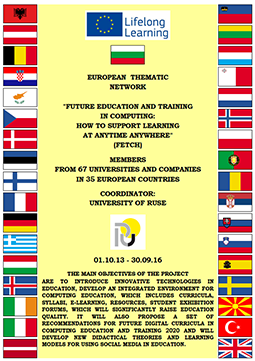Via Ferrata 5, 27100 Pavia - ITALY
FETCH

The ETN FETCH is the new ERASMUS Lifelong Learning Programme (Erasmus Academic Networks) coordinated by University of Ruse (Bulgaria) for the period October 2013 – September 2016 (539461-LLP-1-2013-1-BG-ERASMUS-ENW). Only 7 projects have been accepted for founding from European Commission after a strong evaluation procedure. The consortium includes 67 partners from 35 countries – the list of participants is presented in table 1
The work of the consortium will be based on the rich experience and results achieved by the previous successful networks ECET, DEC and TRICE.
The main aims of the project are the achievement of intelligent growth, and building a knowledge and innovation based computer society through raising the quality of computing education, introducing modern innovative technologies in education, sharing knowledge, discussing methodologies, promoting exchange of good practice between all parties.
The project is expected to produce:
The expected project's impact can be summarized as follows: